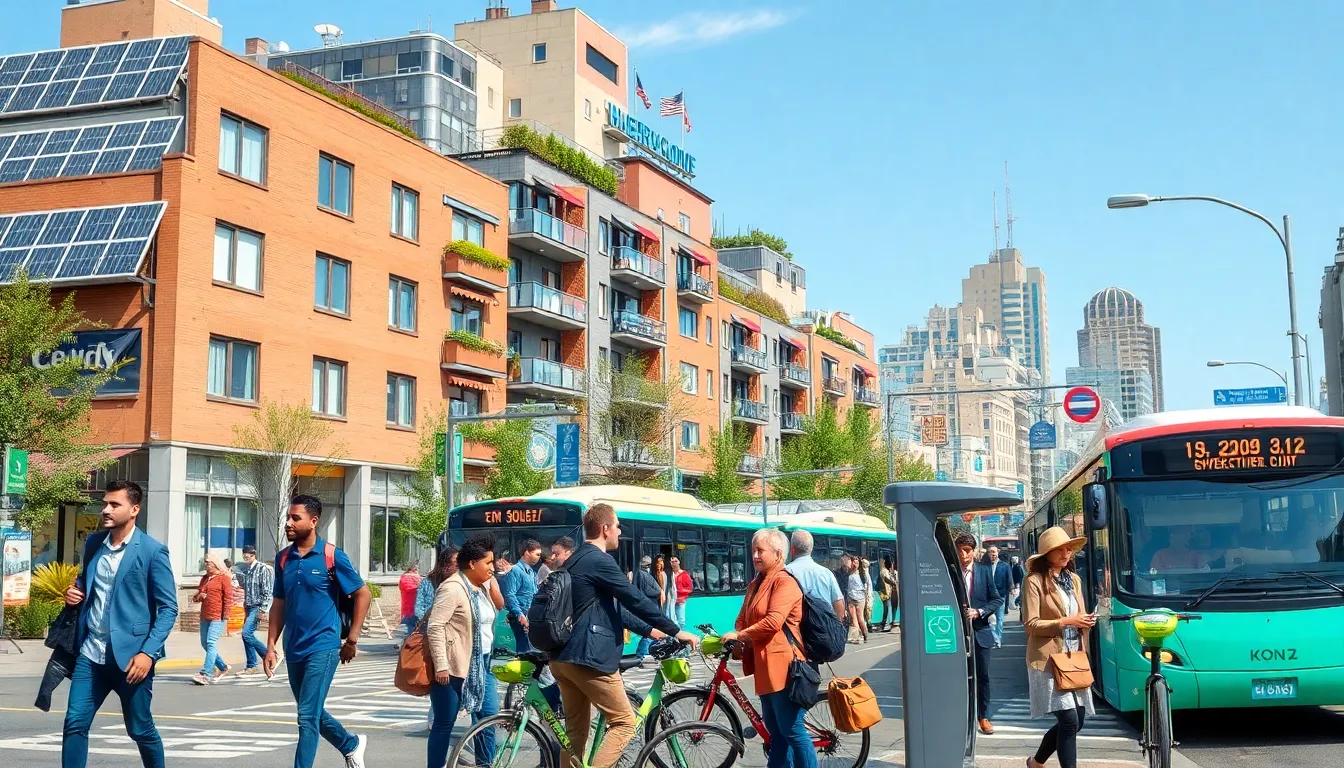As urban populations continue to swell, cities face unprecedented challenges in sustainability, mobility, and resource management. In this landscape, smart city innovations emerge as a beacon of hope, transforming urban living through technology. These advancements harness data and connectivity to enhance the quality of life for residents while addressing pressing environmental concerns.
From intelligent transportation systems to energy-efficient buildings, smart city initiatives are reshaping how people interact with their surroundings. They’re not just about convenience; they’re about creating resilient communities that thrive in an ever-changing world. As cities around the globe embrace these innovations, the future of urban living looks brighter than ever.
Table of Contents
ToggleOverview Of Smart Cities Innovation
Smart cities innovation focuses on integrating advanced technology and data analysis to elevate urban living. These innovations encompass a range of systems and solutions designed to tackle challenges like traffic congestion, waste management, and energy consumption.
- Intelligent Transportation Systems: These systems enhance traffic flow and reduce congestion through real-time monitoring and data-driven solutions. For example, smart traffic lights adapt to current traffic conditions, optimizing vehicle movement.
- Energy-Efficient Buildings: Innovations in building design and management include energy-efficient materials and smart technologies. Automated systems for lighting, heating, and cooling help reduce energy usage significantly, promoting environmental sustainability.
- Waste Management Solutions: Smart bins equipped with sensors monitor waste levels and optimize collection routes. This approach minimizes unnecessary trips and results in lower operational costs.
- Public Safety Enhancements: Smart surveillance systems and real-time emergency response platforms improve public safety. These technologies enable faster communication and response times during emergencies, ensuring community well-being.
- Data-Driven Urban Planning: Utilizing data analytics aids in urban planning processes, allowing cities to respond effectively to residents’ needs. Predictive analytics help identify trends in demographic changes and resource demands.
- Citizen Engagement Platforms: Digital platforms enhance communication between city officials and residents. These tools facilitate feedback and participation in decision-making processes as citizens contribute their insights on urban issues.
Smart cities innovation represents a paradigm shift in how urban areas manage resources and engage with inhabitants, ultimately resulting in more livable, sustainable environments.
Key Technologies Driving Innovation

Smart cities leverage various technologies to enhance urban living and streamline operations. These innovations address critical issues such as traffic congestion, energy consumption, and resource management.
Internet of Things (IoT)
IoT connects devices across urban environments, enabling real-time data sharing. Sensors installed in streets, buildings, and vehicles gather crucial information on traffic patterns, energy use, and environmental conditions. These interconnected systems optimize public transportation, improve waste management, and enhance resource distribution, creating a more efficient urban infrastructure.
Artificial Intelligence (AI)
AI analyzes data from multiple sources to enhance decision-making in smart cities. Machine learning algorithms forecast traffic trends and optimize public transit schedules, reducing wait times and improving commuter satisfaction. AI also supports predictive maintenance for infrastructure and utilities, diminishing service disruptions and enhancing safety for residents.
Big Data Analytics
Big data analytics processes vast amounts of information collected from urban sensors and devices. By identifying patterns and trends, cities can make informed decisions regarding urban planning, public safety, and resource allocation. Analytics enable comprehensive assessments of demographic changes, helping cities respond proactively to community needs and ensuring sustainable development.
Benefits Of Smart Cities Innovation
Smart cities innovation offers numerous advantages, driving sustainable development and enhancing urban living experiences. These benefits manifest in several critical areas, including sustainability and overall quality of life.
Improved Sustainability
Improved sustainability results from smart cities adopting eco-friendly technologies. Smart grids optimize energy consumption, reducing carbon footprints. Intelligent waste management systems employ sensors to monitor waste levels, enabling efficient collection that minimizes landfill use. Water conservation tools track usage patterns, leading to reduced waste. Urban greenery initiatives, supported by data analytics, enhance biodiversity and improve air quality.
Enhanced Quality Of Life
Enhanced quality of life thrives in smart cities through integrated solutions that prioritize residents’ needs. Smart transportation systems reduce congestion, ensuring quicker commutes. Public safety initiatives utilize real-time data for faster emergency responses, increasing community safety. Health monitoring systems connected to smart infrastructure facilitate timely medical interventions. Citizen engagement platforms empower residents, allowing direct input on urban development decisions. Overall, these innovations create vibrant and resilient communities focused on well-being.
Challenges In Implementing Smart Cities Innovation
Implementing smart cities innovation presents significant challenges that require addressing complex issues such as data privacy and infrastructure limitations.
Data Privacy Concerns
Data privacy concerns pose major obstacles in the adoption of smart city technologies. As cities collect vast amounts of data from residents through various sensors and connected devices, ensuring the protection of this data becomes crucial. Cybersecurity threats may expose sensitive information, leading to breaches of personal privacy. Regulatory compliance, such as adherence to the General Data Protection Regulation (GDPR), adds layers of complexity. Municipalities need robust frameworks to manage consent, anonymize data, and educate citizens on data protection strategies.
Infrastructure Limitations
Infrastructure limitations hinder the effective deployment of smart city technologies. Many urban areas rely on aging infrastructure that may not support advanced technologies. Limited broadband access in certain neighborhoods impacts the functionality of IoT devices. Additionally, integrating new smart services with existing systems requires significant investment and coordination among various stakeholders. Cities often face challenges in securing funding, while conflicting priorities can slow down development. A comprehensive infrastructure upgrade is necessary to optimize the potential of smart city innovations.
Case Studies Of Successful Smart Cities
Smart cities around the world showcase innovative solutions to urban challenges. Here are notable examples of successful smart city initiatives.
Barcelona’s Smart Initiatives
Barcelona implements various smart initiatives to enhance urban living. The city employs smart traffic lights that adjust based on real-time traffic conditions, improving flow and reducing congestion. Additionally, Barcelona has introduced a smart waste management system with sensor-equipped bins that signal when they’re full, optimizing collection routes. The city also features free public Wi-Fi in multiple public areas, fostering connectivity for residents and visitors alike. Through its “Barcelona Digital” strategy, the municipality promotes open data access, supporting civic engagement and innovation. These smart solutions have collectively increased sustainability and improved the quality of life for its citizens.
Singapore’s Urban Planning
Singapore exemplifies effective urban planning through smart technologies. The city utilizes the Virtual Singapore digital platform, integrating 3D urban models with real-time data to inform urban development decisions. Intelligent transportation systems enhance traffic flow with live updates and predictive analytics that guide commuters. Singapore’s extensive use of smart sensors monitors environmental conditions, contributing to sustainable resource management like water conservation. Moreover, the city promotes citizen engagement through interactive platforms that allow residents to share feedback on urban initiatives. These comprehensive strategies position Singapore as a leader in smart city innovation, transforming urban living into a more efficient and responsive experience.
The evolution of smart cities marks a transformative journey towards more sustainable and livable urban environments. As cities embrace innovative technologies, they pave the way for enhanced resource management and improved quality of life.
While challenges such as data privacy and infrastructure limitations persist, the benefits of smart city initiatives are undeniable. By prioritizing eco-friendly solutions and fostering community engagement, urban areas can thrive in the face of growing populations.
The future of urban living is bright as cities continue to harness technology to create resilient communities that meet the needs of their residents. With ongoing advancements, smart cities are set to redefine the urban experience for generations to come.


